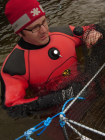B.D.H.K. (Britas Klemens) Eriksson, Prof

Research interests
Understanding consequences of the global erosion of species for the integrity of the biosphere is one of the grand challenges for biological sciences in the 21st century. Biodiversity determines the function of ecological communities, including how they respond to major threats to human welfare such as climate change and nutrient loading. For more than two decades, the overall aim of my research has therefore been to understand how biodiversity loss (in the broad sense) affects the function and resilience of natural communities.
Focal research
The destruction of coastal fish communities through modification of our coastlines is one of the largest ecological catastrophes in northern Europe. Fish in the Wadden Sea is in dramatic decline. Especially threatened are those fish that migrate and use the Dutch coasts for part of their life-cycle and that are constrained by barriers such as seawalls and dams. My prioritized research goals are currently therefore to understand the importance of coastal habitats for fish, why coastal fish is in decline, and how fish in turn shape their own habitat and its wider ecosystem.
Major research accomplishments so far
Biodiversity change: One of the large enigmas in biodiversity research is that the documented erosion of species globally, is not reflected by decreasing number of species in local monitoring data. Baffled by this phenomenon, I have together with internationally leading biodiversity researchers addressed the mechanics of biodiversity change. In 2017, we showed that individual coastal systems across the globe actually have gained species the past 50 years on average (Elahi et al. 2017). This indicated that local and regional processes react on different time-scales to global change. While human induced changes cause extinctions globally, they initiate dynamic processes locally, leading to changes in species composition rather than a decrease in species numbers. In response to this we developed a new species turnover metric (SER) and showed that in nature, biodiversity change is uncoupled from species richness trends (Hillebrand et al. 2018). These discussions led to a personal invitation to write a perspective in Science magazine highlighting that earth currently experience a rapid and large scale reorganization of biodiversity (Eriksson and Hillebrand 2019).
Thus, a major challenge for biodiversity research right now, is to predict the complex consequences of rapid compositional changes and turnover of species. Another current issue is to understand the limits of species ability to compensate for change by reorganising individuals – i.e. what is the potential for immigrating populations (new species, populations with different traits or unique genes) to replace the function of other populations that go extinct? For example, there is a large fear that equatorial marine communities currently are becoming depauperate due to climate migration. Recently, we have contributed to this field by demonstrating that historic (Pleistocene) legacy limit the adaptive potential of a key marine habitat forming species to climate change, by limiting its genetic potential (Duffy et al. 2022).
Landscapes of facilitation: Today we know that regime shifts are typically caused by external “shocks” or gradually changing environmental conditions that exceed critical thresholds, but that some also involve critical transitions, where novel feedbacks propel the system from one self-reinforcing and persistent regime (or stable state) to another. All regime shifts are difficult to manage, but critical transitions pose particular challenges because of inherent difficulties in both predicting and reversing them. It is therefore critical to identify and quantify the importance of biological feedbacks to manage regime shifts. In a series of papers, we have demonstrated how intertidal shellfish systems are shaped by feedbacks that reinforce particular biological configurations (van der Zee et al. 2012, Donadi et al. 2013, Koppel et al. 2015). Recently, we have shown how these facilitation processes shape an intertidal landscapes of mussels and their associated species (Andriana 2020, 2021, van der Ouderaa 2021).
The stickleback wave: Regime shifts are commonly deducted from simple time-series data that average across a larger system. The temporal-only perspective is limiting and represent spatially heterogeneous (natural) systems poorly, because theory predicts that in large ecosystems with environmental gradients, shifts should start locally and gradually spread through space. Thus, despite well-developed theory, many empirical examples, and implementation of critical transitions in European policy and management legislation; we are still far from understanding how to detect and manage regime shifts. By compiling a dataset with both a long temporal perspective and a high spatial resolution, we have been able to empirically document a spatially propagating shift in the trophic structure of a large aquatic ecosystem, from dominance of large predatory fish (perch, pike) to the small prey fish (the three-spined stickleback) (Eklöf et al. 2021). This shift has propagated like a slow moving wave through the system for the past 30 years. Mechanistic experiments and modelling also showed that the different “trophic states” were reinforced by strong biological feedbacks. Our results demonstrate the need to incorporate the spatial component in the monitoring of complex natural systems; to better predict, detect and confront regime shifts within large ecosystems.
